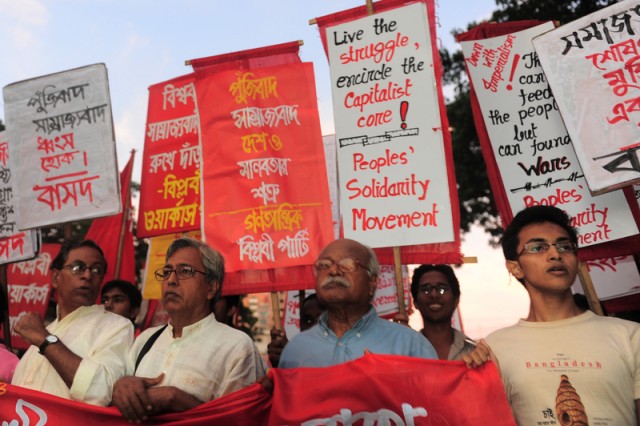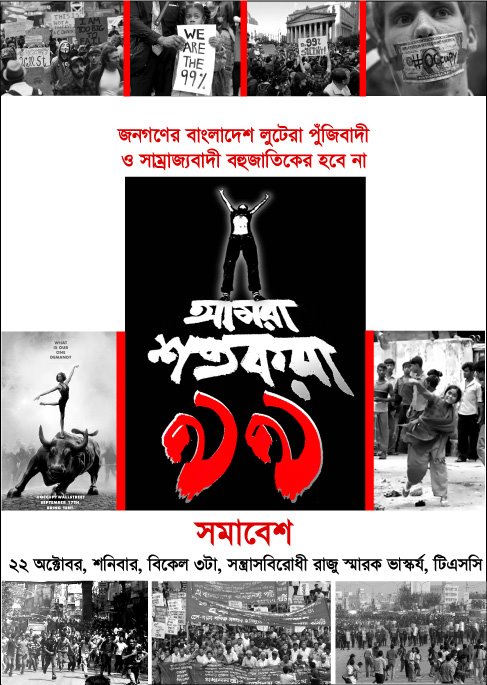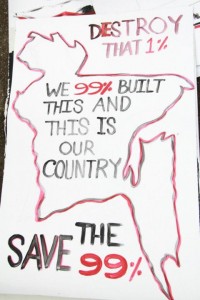Nothing can justify a capital crime, but capital punishment cannot ensure a cure or deterrent for such crimes. Bangladeshis were shocked to learn that eight Bangladeshi migrant workers
were beheaded in public in Saudi Arabia on 7 October, 2011, under
Qisas (an eye for an eye) law for being involved in robbing a warehouse and killing a security guard, Hussein Saeed Mohammed Adulkhaleq, an Egyption national. Three other Bangladeshis were sentenced to prison terms and flogging.
As
videos of similar Saudi beheadings [Warning: Graphic content] were widely circulated in social networks, netizens were enraged about this horrific punishment questioning about the process of the trial and the role of the Bangladesh Government in ensuring these poor migrant workers' rights.
Zahid Masudul Abedin writes [bn]:
কিছু ব্যতিক্রম বাদ দিলে প্রায় সব দেশেই হত্যার শাস্তি মৃত্যুদণ্ড। আমাদের দেশেও তাই। কিন্তু এই মৃত্যুদণ্ডটাও যে কত ভয়ঙ্কর ভাবে কার্যকর করা যায় তারই যেন একটা উদাহরণ জনসমক্ষে শিরশ্ছেদ। বুঝলাম আইনের সঠিক প্রয়োগ করা উচিত কিন্তু এই মধ্যযুগীয় বর্বরতা কি এই যুগে ত্যাগ করা যায় না?
Almost every nation in the world exercises capital punishment. Our country also belongs to the group. But how brutallly the execution of punishment can be is evident from this type of public beheading. I understand that the law must be properly implemented, but can't we refrain from this kind of beastliness from the middle ages?
Mosaddik Uzzal
questions [bn]:
ফাঁসি রহিত করা হোক এমন আইন আমরা চাইনা। কেননা এই মৃত্যু দণ্ড ব্যবস্থা না থাকলে সমাজে অপরাধের সংখ্যা বেড়ে যাবে। তাই বলে ১ জন কে হত্যার জন্য ৮ জন কেন জীবন দিল? এই কেমন আইন?
We are not against capital punishment, because this may increase the rate of crime in the community. But why eight people had to die for one person's death? What kind of law is this?
Niaz Murshed Chowdhury [bn] has some points to ponder:
এ দৃশ্য সৌদি আরবে এতটাই হরহামেশা ঘটে থাকে যে এটা তাদের কাছে কোন প্রতিক্রিয়া সৃষ্টি করে না। বরং সৌদি নীতি নির্ধারকরা যুক্তি দেখায় এভাবে প্রকাশ্যে শিরশ্ছেদ তথা “আল্লাহর আইন” বাস্তবায়ন মানুষকে সাবধানী করে। এটা সমাজে অপরাধ প্রবণতা কমায়। এই একই যুক্তি গত চব্বিশ ঘণ্টায় ইন্টারনেটে দেয়া মতামতের কল্যাণে বহু মানুষের কাছ থেকে জানতে পারলাম। অনেকেই এটাকে বর্বরতা নয় বরং সমাজ থেকে অপরাধ কমানোর কার্যকরী একটা উপায় বলে মনে করেন। সব কথাই শুনলাম, সব কথাই বুঝলাম। কিন্তু এটা বুঝলাম না, ১৪শ বছর আগে করা এই “আল্লাহর আইন” কেন এখনও সৌদি সমাজ থেকে হত্যার মত অপরাধ বিলুপ্ত করতে পারলো না? কেন ২০০৭ সনে ১৫৮ জন এবং ২০০৮ সনে ১০৮ জনকে শিরশ্ছেদ করতে হলো? ১৪শ বছর কি “আল্লাহর আইন”-এর জন্যে যথেষ্ট ছিল না সমাজ থেকে এ ধরনের অপরাধ বিলুপ্ত করতে?
These (horrific) scenes are so ubiquitous in Saudi Arabia that they do not create any reactions among the Saudis. Rather the policy makers vouch for this punishment saying that implementing “God's Law” warns people, makes them careful. It reduces crime in the society. I have read the same kind of logic in many internet postings. Many believe that this is not barbarism, rather an effective tool to reduce crime in the society. I have read and understood all this, but could not fathom why the “Gods Law” initiated 1,400 years ago could not eradicate capital crimes like killing from the Saudi communities? Why they had to behead 158 persons in 2007 and 108 people in 2008? Was not 1400 years enough for the “Gods Law” to eradicate these kinds of crimes?
According to
news reports [bn] the Bangladesh government had tried through diplomatic channel since 2007 to seek pardon for the eight Bangladeshis. Even the president of Bangladesh wrote a letter to the Saudi King asking for forgiveness. The Saudi foreign office replied that only the victim's family can forgive the perpetrators. The Bangladesh government did seek forgiveness from the victim's family in Egypt but they refused.
Swadesh Roy writes in the Times Of Assam:
The persons who were beheaded, their trial were basically far from international standard. All proceedings were in Arabic. Accused persons could not understand it. The court did not arrange any system to help the accused understand it. Besides, most defendants had no defense lawyer. Eventually, for the language barrier and lack of any help from the lawyer, they could not defend themselves. So, it is not a trial of any international standard, it is actually a mock trial.
Niaz mentions that confession through tortures and framed cases are regular affairs in such mock trials. He also quotes from the
Amnesty report:
The Egyptian man was killed during a clash between the Bangladeshi workers and a group of men who allegedly were stealing electric cable from a building complex where the Bangladeshis worked.
He asks why the media is ignoring these “group of men” and why they had been absent in the trial process?
And of course there are some people who are more equal than others. Niaz mentions the hypocrisy existing in the Saudi Law presenting the case of
William Sampson, who survived such capital punishment because he was a British national. Sampson wrote in the Guardian:
Finally released in August 2003, after 964 days of solitary confinement, torture and dehumanising terror, I harbour no illusions about what saved me: my passport. …Meanwhile, of course, Saudi's poor migrant workers from Somalia, Bangladesh, the Philippines or Pakistan are virtually doomed if they face a capital charge.
Manob O Manobota [bn] has this to say to the King of Saudi Arabia:
আপনি কি জানেন, এ অভিযুক্তরা সবাই তাদের মনের কথা আপনার বিচারকদের কাছে জানাতে পেরেছিল নাকি রায়টি একতরফা হয়েছিল?
Do you know whether these convicted did have the liberty and means to tell the truth to your judges or the verdict was made without due process?
Pushpita [bn] questions the Bangladeshi government:
কিছু কি করা যেতোনা. এই অসহায় শ্রমিকদের জন্য? কারো কি কোন দায়িত্ব ছিলনা?
Couldn't anything be done for them? Did not anybody have any responsibility?
It may be noted here that
Indonesia has banned the sending of maids to Saudi Arabia after a migrant worker from West Java was beheaded in that country for killing her employer, who abused her.
Unheard Voice points out that there are many more Bangladeshis waiting to be beheaded:
These men didn’t have any power, money, influence. They hold green colored passports that have very little international leverage and they work and live under conditions just above slaves. When they die, they are easily replaced and forgotten. 16 more are waiting in line to take the 8’s place.
Rubana Haque is in grief seeing the silence of the world:
Strangely, the world seems unsure and divided on the concept of peace. On one hand, three outstanding women have been awarded the Nobel Peace Prize for their contribution to the non-violent movement in their countries: Liberia and Yemen, and on the other hand, eight of us have just been beheaded in the most violent manner in Saudi Arabia.
While Saudi Arabia seeks to secure justice through capital punishment in its soil, the Nobel committee has commended these three women for strategically voicing out their protest. Point is, when will the world wake up to shun the violent governments and when shall we all stand united on the idea of peace, the chimera of our modern times?
First published in Global Voices Online